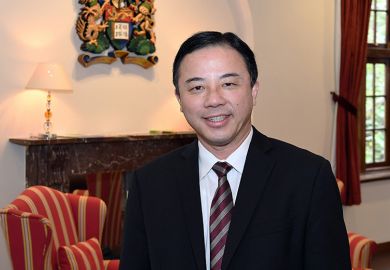Anyone who has been in the vicinity of a UK university in recent weeks will have heard something snap.
Snapping, as Sara Ahmed observes, is not always planned; it happens when something ends up being too much – and once it happens, you can wonder what took you so long.
Ahmed snapped in 2016, when she publicly resigned from her position as director of the Centre for Feminist Research at Goldsmiths, University of London, over its “failure to address the problem of sexual harassment”.
Being told that they must suffer another cut to their pensions has now brought thousands of lecturers, librarians and others to snapping point. A snap, says Ahmed, breaks a bond, when maintaining that bond would require “overlooking violence”. Johan Galtung, the Norwegian sociologist, defined violence as “avoidable insults to basic human needs”. A pension cut of the proportions proposed, without independent scrutiny of the valuation behind it, was clearly an avoidable insult: a number of vice-chancellors have now acknowledged as much.
But snapping is never the starting point. Academics and academic-related staff have historically accepted relatively low pay in exchange for autonomy, job security and a decent pension. Snapping breaks a bond, but university leaders seem unaware that there ever was any kind of bond, as over the past decade they have gone about replacing trust and autonomy with a culture of control, and job security with “flexible contracts”. They nodded tolerantly along as our pensions were decimated while awarding themselves their infamous pay rises.
Another bond broke when management teams learned the language of academic-bashing, legitimising control by speaking of professional intellectuals as if they were feckless children who couldn’t be trusted. Academics might now wonder why it took them so long to declare that the lack of trust is mutual.
It has become clear in recent weeks that trust is spectacularly broken. Many of our students snapped with us. Students who have been redefined as customers and offered a product called “the student experience” have come out to support the people who are genuinely part of their experience of university life and learning. Galtung says that one form of cultural violence indulged in by ruling elites “is to blame the victim of structural violence who throws the first stone”. But that hasn’t worked in this case. Our students have joined us on the picket lines and occupied management spaces.
In her moving open letter to the vice-chancellor of the University of Leeds earlier this month, the priest and librettist Alice Goodman, the widow of a Leeds academic, wrote with sadness of the false assumption of the managerial university that “teachers and scholars are infinitely interchangeable and replaceable”.
But it isn’t only vice-chancellors’ fault. They are under pressure, too – and one day, perhaps, they too will snap, rather than bending endlessly under political pressure. They and their management teams are relentlessly offered opportunities for opportunism. On 8 May, a company called Westminster Insight is offering a conference called Adapting to the Transformed Student-Consumer, in line with the creation of England’s new and allegedly student-focused regulator, the Office for Students. Delegates will be brought up to date with best practice in “expectation management”, which presumably means learning to manage our transformed consumers’ disappointed anger when they recognise the disrespect for their humanity that inheres in the attempt to make education a consumer experience. The jewellery tycoon Gerald Ratner notoriously once implied that his customers were stupid enough to buy “total crap” – with disastrous results.
Sadly, academics also step up to legitimise the violent deformation of the university project. The blurb for a recent lecture in Durham University’s Future of the University series by Katherine Hayles, professor of literature at Duke University, claimed that universities can no longer be “the privileged site of knowledge creation and dissemination”, and must instead become “busy informational crossroads” focused on the “value added” of their contributions “to human and planetary flourishing”. I didn’t attend the lecture but I hope that someone who did asked who is going to find a quiet moment to come up with the ideas that will cause such flourishing when we are all sitting at that busy crossroads calculating our value added (and presumably trying not to get run down by a truck).
The same blurb dismisses traditional universities as “cloistered spaces”: familiar ivory tower rhetoric that hits laughably and painfully wide of the mark. Like most academics reading this, I spend more time in meetings responding to the latest plans of people whose job descriptions require them to “manage change” than I spend “cloistered” with either my students or my research.
Something that has snapped isn’t easy to mend. Apart from offering us a fair pensions settlement, university leaders will need to relearn and model some respect for university students and staff, not as transformed consumers or education providers but as intellectually talented dynamic human beings. That will be a tall order in the current political climate, but it will be an even taller order to maintain UK higher education’s international reputation for excellence when word starts to spread that our universities are broken.
Sarah Colvin is Schröder professor of German at Jesus College, Cambridge.
Register to continue
Why register?
- Registration is free and only takes a moment
- Once registered, you can read 3 articles a month
- Sign up for our newsletter
Subscribe
Or subscribe for unlimited access to:
- Unlimited access to news, views, insights & reviews
- Digital editions
- Digital access to THE’s university and college rankings analysis
Already registered or a current subscriber? Login







